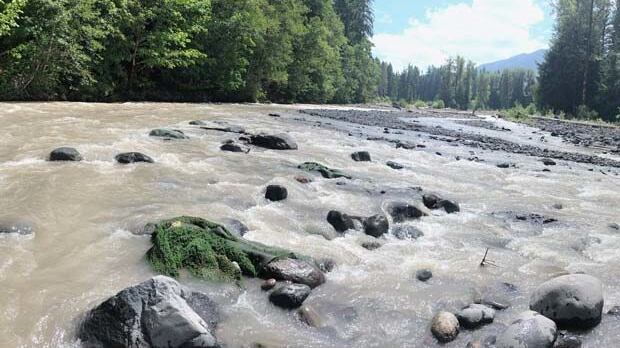As the calendar closes on a year that saw the owner of the Electron Dam come under fire for actions during a construction project on the Puyallup River, the Puyallup Tribe is suing Electron Hydro, LLC.
The Puyallup Tribe has filed a federal lawsuit against Electron Hydro over alleged violations of the Environmental Protection Act.
During a construction project this past summer, Electron Hydro put sheets of artificial turf equating to more than 2,000 square yards into the river without a permit. Some of the turf disintegrated into tiny pieces of crumb rubber and flowed downstream, all the way into Commencement Bay.
Lisa Anderson, an environmental attorney for the Puyallup Tribe said there is “no way to retrieve that crumb rubber.”
“Even within just the last few weeks, we are still seeing large chunks of turf that had washed away … if you walk the length of the Puyallup River, you will find pieces of plastic green grass that are now just strands of green plastic strewn about,” Anderson described. “It’s embedded in the sediment. There’s so much still there.”
The turf is still being analyzed, but it’s believed that it could do serious harm to animals that live in and around the river. That includes the migrating Chinook salmon — a vital food source for the endangered Southern Resident orcas.
“It is assumed that if not all, a portion of this crumb rubber is recycled tires, that’s just standard in the industry for turf … that could have impacts on orcas and other wildlife in the region besides fish, including elk and things that are eating from the shoreline,” Anderson said.
The artificial turf incident is not the only environmental disaster cited in the suit. In a statement, the Puyallup Tribe said that Electron Hydro “stranded, suffocated and pulverized thousands of adults and juvenile fish” during construction work this past summer.
Then, during the turf cleanup process, Electron Hydro constructed a rock dam without permits and, in addition, was not able to use the fish ladder during the fall migration. Anderson said they may have damaged the fish ladder permanently.
“Because of the construction that was done this summer, that fish ladder was potentially inoperable the entire Chinook run of the fall, so prime spawning areas were unavailable to Chinook salmon in the Puyallup River,” Anderson said. “So that will have an impact on populations … and we don’t know how well that fish ladder is going to function overall going forward.”
Anderson said Electron Hydro has a history of ignoring permits and environmental regulations.
“It’s time for impacts for fish to cease. They have been violating federal law for the entire time of their ownership. And so we’re seeking for those impacts to stop,” Anderson said. “That would mean no diverting water and fish … the rock dam itself also needs to come out, and any other unpermitted fill that’s impacting fish needs to be removed, and the fish ladder needs to be in operation at all times and proven to be working.”
The Puyallup Tribe and Pierce County executive have both stated that the dam should be removed altogether, with the reason that it is doing far more harm than good.
“We have waited for them to come into compliance and stop impacting fish and they have not done it,” Anderson said. “Right now, as that dam exists, there is no way for them to operate and safely allow fish to coexist.”
Anderson pointed out the dam has no local customers, as Puget Sound Energy is no longer buying electricity from Electron Hydro.
Electron Hydro is facing two other federal environmental lawsuits at the moment.
In a statement to KIRO Radio, Electron Hydro said that their construction project “will comply with all Federal Endangered Species Act requirements for fish protection and will contribute substantially to salmon recovery efforts.”
“Electron Hydro has already built a premium Chinook acclimation facility below the diversion from which 320,000 Chinook smolt were released last May into the Puyallup River by the Puyallup Tribe,” the company stated.
This story was written by MyNorthwest.
Cox Media Group








